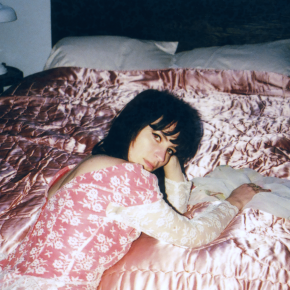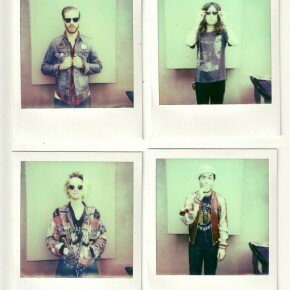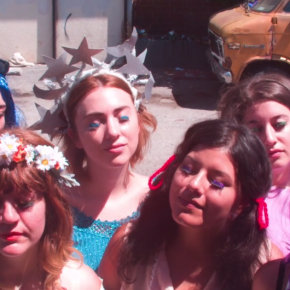
Here at Cultist, we have two official rules in our very unofficial rule book. 1) Only write flattery about people/music/artists/bands we genuinely love (unless it’s hate mail). 2) Always tell a person/musician/artist/band exactly what fanatical stalkers we are of he or she/what he or she does. This is how we preserve the integrity and utter shamelessness of Cultist, although all of that could very well change once we start making a livable wage with this operation. I kid.
All of this unabashed fanning out leads me to my current old-timey musical crush, King Dude, who is pretty much the quintessence of cool masculinity, so much so that I regressed into a nerdier version of Daria meets Doogie Howser the minute we entered the same room. The macabre King, as I apparently like to call him, possesses an air of eerie intrigue, a withdrawn and pensive quality that is a little bit intimating upon first meeting (but that could just be because he was skulking around a dark wood bar in a dark leather booth in a dark all black outfit, like Johnny Cash during his darkest days, only much more loquacious and forthcoming about his passions and demons, especially after a few whiskeys).
Don’t be fooled by their stoner stage name, King Dude is anything but a greasy-haired grom you’d purchase a dime bag from while lazing around the Venice Beach Boardwalk with a paper-bagged 40 oz. in hand. Quite the contrary, the Seattle-based occultist-meets-americana rocker, known to almost none of you as TJ Cowgill, cites pain and suffering as two of his greatest muses, alongside the warm-embrace of satan and beautiful women (he didn’t actually say this to me, but I’ve taken the liberty of improvising for shock value, based on the awesomely heated and tangental interview we conducted at the Thirsty Crow in Echo Park a couple of weeks ago). After seeing him live at the Echo in Los Angeles (with a surprise cameo from Chelsea Wolfe), I knew I had to exchange a few words with the baritone brute who’d so brazenly taken a swig on stage straight from the bottle. Swoon.
(photos by Rick Rodney)

Did you consider “Barbara Ann” to be a romantic song when you wrote it?
Ya. To me it’s very romantic. Probably one of the most romantic songs I’ve ever written. It’s about – well the whole record is about – desperation, and what people are willing to do, the lowest that people are willing to go, depending on how you look at it. The murder, the killing even the thing that you love because you love it kind of love. And that’s the kind of love that not everybody feels or really recognizes. I’m obsessed with finding those narratives, and really writing in those characters. When I found that story, in my mind or wherever it came from, I was inspired. Yes, very romantic, indeed.
My relationship with music is emotionally abusive. I love the songs that are about pain and misery and literally murdering the person you love. Does that make me a sicko?
I think that’s beautiful. I think there’s a beauty in that, and that you can’t really find the beauty in just a flower or a nice sunset. I think beauty has a bit of ugly in it, to give it traction. To let you understand what the beautiful part is, sometimes you need murder or death or tragedy. It gives the good feeling something to reflect against. I think all good stories have it. Some have more, some have less. The ones that have none at all, and are just purely love based romances, those are just the most boring. You’d have to have no brain cells to like a song that goes like “I met a girl and she was really great and we fell in love and we got married and I had kids with her and we never actually died and it was wonderful.” Fuck you. You know, I don’t want to listen to that. But people make songs like that, and they make a lot of money with it, but I think that those people are stupid and the people that like it are stupid, and I don’t care about stupid people I guess. I want people to think, and they do. If they’re not challenged, they won’t.

Do you write songs based on your personal experiences?
I hadn’t in the past. I only used narrative. A character or protagonist with a problem that needs solving. They are like little tiny vignettes, little stories, and they should come across as that, and when they don’t, it’s a failure. Recently, on the new record, I’ve been experimenting with songs that are sort of in that same structure, but way more personal. I love a dual, layered song. The nature of the song can seem like one thing, but there’s a hidden meaning to it. I’ve been trying to hide in some personal stuff lately, which has been really fun. It used to just be hiding in stuff about religion or my belief structure or moral and ethical things, but now I think I’m finally ready. Writing a song about your girlfriend or boyfriend or family or your life is an easy trap to fall into, because it’s really easy to do badly. Most people do it badly, because that’s where they start out writing. I didn’t start there, because I know it’s such a prickly pear. I spent so much time getting away from that, but now I feel like it takes balls to be that honest, so I’m trying to do that song, but do it really well. It’s fucking scary. But I just try and challenge myself. If you take off all the armor of being a fiction writer, and just start writing your autobiography, that’s scary. I’m not ready to do that all the way.
For me, writing is like therapy. I put myself in the story to work out the issue, and then when I finish it, it’s resolved. Do you have that experience?
A lot of times they aren’t personal problems I have. I obviously don’t have the problem that the character from Barbara Ann has, but I can put myself in other people’s situations. I’m very empathic. I think that is a gift of good song writers, to understand what it’s like to be in somebody else’s shoes. I’ve been in a lot of different roles in my life, so maybe that’s why I’m good at that. I’ve had a million jobs and lived a million places and lives. They don’t really provide closure, sometimes they provide a new problem. So that’s cool. I’m like, wow I never even thought about that problem until now. It’s sort of like reverse therapy, but it’s good to think about these things, whether you resolve it or not, it makes you more aware of hypothetical situations you could be in. Maybe I’m learning lessons or exorcising demons or creating more problems for myself. I don’t know, but I know I love the process. I really love the songs. I love them like children that need care and attention. When they come to life and they’re good, I feel better than anything in the world. I gain mostly joy from the process, or else I wouldn’t do it.

When did you start making music?
The first band I liked was NWA. My friend stole the tape from Fred Meyer’s, which is a drug store. I was like, “This is really bad, I like this.” They were saying bad words and talking about fucking and I was so drawn to it. And then when I was 9 or so, my friend gave me a Guns ‘N Roses tape, and I completely identified with it. It became my mantra. I went home and cut all my jeans, and we were really poor, and my sister was so pissed she beat the shit out of me. I really got into rock n’ roll for about a week after that, because of this tape. So that went on for a while, but it seemed really unattainable, because in the “Welcome To The Jungle Video,” Axl Rose comes to LA to get famous, and he ends up on drugs and turns into a demon woman prostitute. I was like, “Well, I love rock n’ roll, but not enough to do that. I don’t want to end up on a bus doing heroin.” And then Nirvana came out. And I was watching the video on TV with my brother, and he told me they were from Seattle, and I was blown away that a band could be from Seattle. My brother was like “Yea, dummy, bands can be from anywhere.” Right after that, I went out and bought a piece of shit guitar that was all warped from the sun, and I’ve been playing ever since.
I’m fascinated by people’s stories of rebellion, how they channeled their feelings of awkwardness and not belonging into some kind of creative outlet. My secret dream is to be a singer. I always wish that when I was younger, my angst and rebellion manifested itself through art, but instead I was just a crazy depressed anorexic.
I think everyone’s a singer. I think you’re a singer as much as I’m a singer. I don’t believe in training or school of any kind. Ever. Maybe half of high-school. If you drop out junior year you’re probably smart enough.
So no need for AP Art History?
I have no idea what that means and I’m doing fine. I’m dead serious. Don’t go to school to learn how to sing. Those kind of standards are put down on us like a prison cell, to be this good all the time. Where music came from, the blues and real country music and Appalachian music, people just sang because they were fucking bored, and they had the folk tradition in them and everybody sang, even if they weren’t very good. I’m sure the really bad ones were encourage to dance instead, but you were still a part of it. That’s what I’m trying to make with this thing, a return to a more classic concept of what music really is. I would encourage anyone in the world to cover my songs or to sing them better if they think they can. I don’t really think of myself as a good singer, I think of myself as a soulful singer. I think that’s a difficult thing for people to do, to shed off the caring of how they sound.

When did you pick up the baritone, throaty singing style?
On the last record. Before that, I didn’t really do it. I got this old ribbon microphone, the kind that they used on the radio in the 40’s. The way that they’re designed, they’re very active, they pick up a lot of sound, so you’re able to sing more quietly than you would with a regular microphone. I used to record my songs on the mic that came with the Apple computer, but then I got this decent microphone and I realized you could sing a little quieter and you could actually hear it, and it forced me to play a little quietly and find guys that understand the subtlety of old music. Everyone’s so concerned with being loud all the time, I’m trying to be loud when it’s important, but not all the time. It’s about the balance.
What do you think about this whole nostalgia for everything old that’s so popular right now. This whole culture of artisanal everything?
Pickled everything…
Right. Making our own sodas even though we worked for very long, and spent a lot of money, to try and invent faster, cheaper way to make soda.
Even the guitar I play is really antiquated. I love it to death, but stringing it is a nightmare. I spend all this time stringing it, and I know we’ve come up with a better system, but it’s so faithful to the era in which it was developed. It’s so crucial to the sound. Sometimes things like that can be more difficult, but you learn something in the process, there’s so much more thought and care involved. I say that now, but I have a Gretsch endorsement, and I love Gretsch.

What’s the most important element of your songs?
Vocals, definitely. A bad singer and bad lyrics will sink it. I despise bands that say nothing. Sigur Rós is a perfect example of a band that chose to say nothing, but they sound amazing live. Mentally I just can’t get over that their music says nothing. I’m not interested in nothing. There’s enough nothing in the world. There’s enough empty thought. If you have the opportunity to say something and make it count, then you should say what you want to say. And if what you want to say is nothing, I always end up not wanting to listen. I hope to steer the trend away from party music and songs about pizza and hamburgers. It needs to exist, but it doesn’t all need to be like that. Sincerity is really important, and sarcasm, although it can be a sign of intelligence, can be the worst thing sometimes.
What are you currently listening to?
The Rolling Stones. I’m interested in sexy music right now. The next album is called Fear, but it’s also about sex. I find that those two emotions are very closely related. I think because it’s a right of passage to become sexual, so it’s scary for most people. It’s a horrifying process of embarrassment. For guys it’s like “Will I ever lose my virginity?” and for women the cliche is “Will I ever find true love?” I love the thought of that fear never really leaving; it’s a childhood fear that you carry with you.
What’s the best part about being in love or lust?
They are two very different things. The best part of being in love is feeling good, that serotonin kick you get all the time. When you’re in love, you feel real good and things make sense and everything is telling you to make babies and just keep doing it forever. Lust is similar, but it’s darker and there’s more fear involved






![[PEN PAL] Dear Francesca Woodman](/wp-content/plugins/featured-post-with-thumbnail/scripts/timthumb.php?src=/wp-content/uploads/2012/02/FW-FACE.jpg&h=73&w=73&zc=1)
![[SEVEN QUESTIONS IN HEAVEN] Antwon on Enjoying Friendship, Being Very Lazy, and Sex All the Time](/wp-content/plugins/featured-post-with-thumbnail/scripts/timthumb.php?src=/wp-content/uploads/2014/05/Screen-shot-2014-05-06-at-1.54.32-PM.png&h=73&w=73&zc=1)
![[BEST VIDEO EVER] Nü Sensae “Spit Gifting”](/wp-content/plugins/featured-post-with-thumbnail/scripts/timthumb.php?src=/wp-content/uploads/2013/01/Screenshot2013-01-15at110320_zps377596a41.jpg&h=73&w=73&zc=1)
![[SEVEN QUESTIONS IN HEAVEN – BERSERKTOWN EDITION] Hether Fortune Of Wax Idols](/wp-content/plugins/featured-post-with-thumbnail/scripts/timthumb.php?src=/wp-content/uploads/2015/06/image1.jpg&h=73&w=73&zc=1)